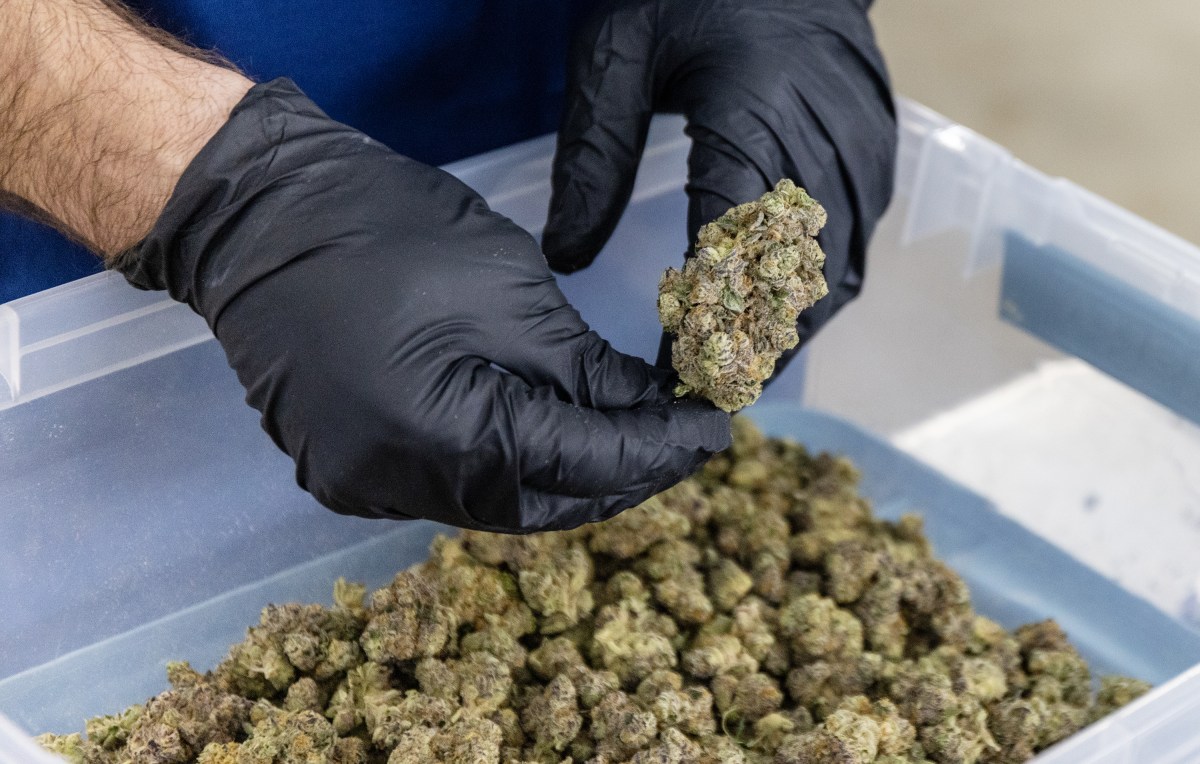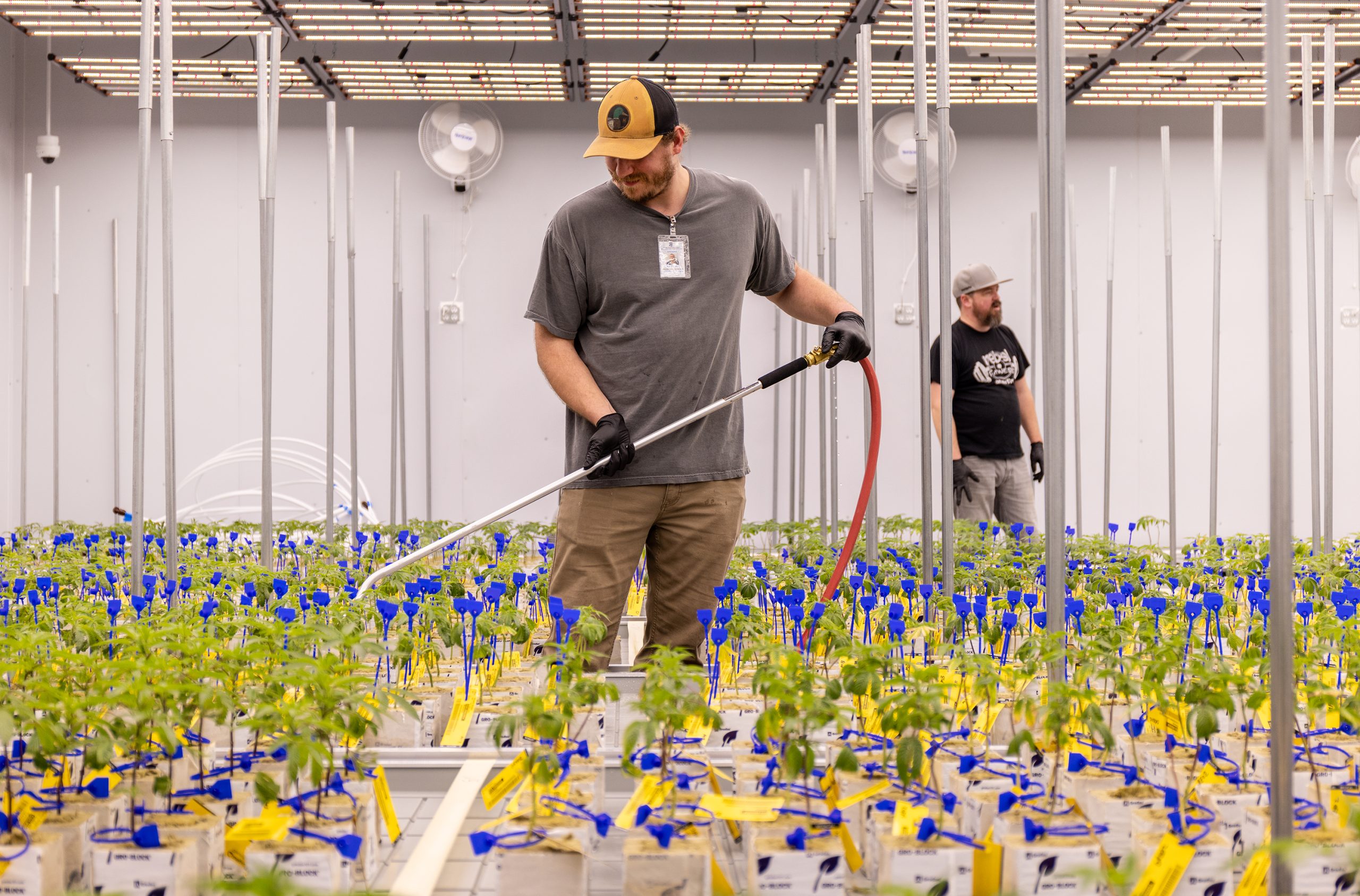Mississippi Today
‘The state threw them to the wolves’: Health department struggles to manage massive medical marijuana program
‘The state threw them to the wolves’: Health department struggles to manage massive medical marijuana program
Behind closed doors, Mississippi’s eight-person medical cannabis office is struggling against its workload.
The Health Department office charged by the Legislature with running Mississippi’s new medical marijuana program is steeped in disorganization: agents rarely visit cultivation sites, application backlogs reach hundreds deep, and lags in communication with licensees often stretch on for weeks, a Mississippi Today investigation found.
Business owners feel frustrated, unheard and worried that the millions of dollars they invested — and the tens of thousands they paid in fees to the state — could go up in smoke.
“The state threw them to the wolves,” cultivator Joel Harper said of the fledgling marijuana office. “They should have paid the money to bring in professionals, even a third-party consultant. Instead, they’re sending people out into the cannabis world who have no idea about anything cannabis.”
At the center is a handful of workers, tasked with unrolling a massive program without enough staffing to operate efficiently. Cultivators say when they do hear back from the office, the messages are incomplete or inconsistent – especially when it comes to how they construct their farming facilities.
And that’s if they hear back at all. The office already has mountains of unprocessed paperwork.
As of the second week of January, 277 work permit applications sat in a queue waiting to be processed, according to copies of the office’s records obtained by Mississippi Today. Could-be cannabis workers can’t start their jobs without permits. Another 995 patients had yet to to be told whether or not they’ve been approved for their dispensary cards.
Three dozen businesses had their own applications stuck, along with almost 40 other medical practitioners, the records show.
In a statement to Mississippi Today, department of health spokesperson Liz Sharlot acknowledged the backlogs.
“We are working with the MMCP (Mississippi Medical Cannabis Program) Licensing Director and the team on how to put more efficient processes in place,” she said.
Even when the office hired new workers – growing from four to eight in recent months – little was done to train them on the law and the industry, an employee of the health department told Mississippi Today. The employee spoke on the condition of anonymity out of fear of repercussions.
The health department said in October, when Mississippi Today first reported the backlogs, it was working to fill 25 more positions. That has yet to happen.
The health department worker said much of the disorganization stems from the office’s former director Kris Jones Adcock.
The Department of Health did not answer questions related to plans to increase staffing levels or what medical marijuana-related training their current staffers received.
“The people of Mississippi deserve better,” the worker said.

During one five-week period, Adcock held three jobs simultaneously within the health department: the cannabis role, the head of a domestic violence office, and a promotion to a department-wide role as assistant senior deputy.
The health department didn’t respond to questions about the effects managing three positions may have had on her ability to run the cannabis office. Adcock now holds only one department-wide role: Assistant Senior Deputy to the Senior Deputy.
Adcock announced two weeks ago that the office’s attorney, Laura Goodson, would be the acting director.
The health department employee also said Adcock set a tone of rushed processes and absentee leadership that has left the marijuana office in clean-up mode.
“There was no due diligence on some of the applications,” the worker said. “Some of it was her knee-jerk reaction to get stuff out the door after it (the backlog) built up. Instead of an orderly process, it was just rushed.”
Emails obtained by Mississippi Today show that it wasn’t just cultivators struggling to hear back. The head of a lab testing facility also expressed frustration.
“The complete lack of communication is just not feasible any longer,” Rapid Analytics director Jeff Keller wrote to Adcock on Dec. 16. “I am begging you to please just name the time on Monday and I will make it work.”
A month later, one of Keller’s employees sent his own desperate plea to the office.
“I’m trying to find out when I’ll be able to start working there,” he wrote about his job at the lab. “My background check was cleared on December 15th … I’ve left multiple messages but have not received a response.”
The CEO of test facility Steep Hill, Cliff Osbon, sent his own email on Jan. 13 on behalf of four employees who still needed their work permits so they could begin work and the lab could start testing marijuana.
Neither testing lab responded to Mississippi Today’s request for a comment.
Zack Wilson, a micro-grower in Potts Camp, said he had a worker waiting more than two weeks on a work permit.
“You send an email. Wait two weeks. Email again,” Wilson said. “You just sit and wait. I know they’re short staffed, but come on guys.”

Cultivators say unanswered questions have led to a murky-at-best understanding of how some of the regulations are being interpreted and enforced.
That’s bubbled up with the use of so-called “adapted greenhouses,” putting already competitive cultivators more at odds. The regulations call for no outdoor growing, a solid roof, permanent walls and slab foundations.
In the early days after the law was passed, Harper, the head of Como-based Pharm Grown Canna Company, said officials made it clear to industry hopefuls that greenhouses would not be approved as growing facilities. So he, like many others, invested money in renovating a large warehouse that would rely on artificial lights.
In the last few months, he’s noticed much cheaper greenhouse-style structures popping up with the health department’s approval.
Harper and others who followed the bill’s creation closely say greenhouses go against the spirit of what legislators intended.
The debate comes down to word definitions that aren’t spelled out in the law itself. If the bill doesn’t allow any “outdoor” growing, that should mean the structure can’t utilize the sun, some argue. The greenhouses have clear-plastic roofs to use a mix of sun and artificial light. If the facility needs to have a solid and secure roof, clear plastic shouldn’t be permitted, according to some interpretations.
Cultivators like Wilson don’t see it that way.
“The roof certainly isn’t made of liquid or gas,” he said. “Plastic is a solid.”
Wilson said his site plan, including the materials he was using, were all approved by the health department when he handed in his application. He was given his cultivation license in August, according to public records.
Another cultivator, Jason McDonald, is building his own greenhouse under the company name SADUJA. He received his license on Dec. 22. He said his roof is two layers of clear plastic. He has screened-in shutter windows, a cement foundation and plumbing. McDonald runs a tea farm. He’s used to meeting regulations and dealing with bureaucracy and hopes to start growing marijuana by the end of the month.
Mississippi Today also obtained documents Adcock signed off on the site plan, including a hand-drawing where the facility was labeled “greenhouse.”
“I emailed them and asked: ‘Will this greenhouse we’re planning to build meet regs?” McDonald recalled. “They came back and said: ‘you need to read the regulations’ so, I quoted the regulations and said ‘what’s the ruling on this?’ and they said ‘you need to read the regulations.’ I added the specific subsection, and then never got an answer back.”
The word greenhouse, he said, can summon something different depending on the cultivator. He, like others, agrees Mockingbird Cannabis should have been cited for its greenhouse that was under scrutiny in the fall because it had roll-up sides, not permanent walls.
Mockingbird also built a massive state-of-the-art warehouse as its main cultivation site.
“I will tell you we haven’t done anything we didn’t disclose to the Department of Health and in our application,” Mockingbird CEO Clint Patterson told Mississippi Today in October.
Harper and other warehouse operators don’t blame the small businesses for building greenhouses — they’re cheaper to construct and run, leading to significantly higher profit margins. They blame the state for approving them.
“We want them to succeed,” Harper said of greenhouse growers. “We just want them to do it in the way everybody else had to.”
The leading authors behind the bill that created the medical marijuana program could not be reached by Mississippi Today after repeated requests for comment. Rep. Lee Yancey said in the fall that it was the health department’s job to interpret the rules, and if the statutes were not clear enough, it would be addressed in the Legislature.
Sharlot, the health department spokesperson, said it did not approve a model for greenhouses and pointed to the “regulations that specify the physical requirements for a cultivation facility.”
“The MSDH met and continues to meet its statutory requirements as it did with the aggressive timelines in creating the MMCP,” she said.

On Jan. 11, Adcock brought her recommended changes to cannabis regulations before the board of health hoping for the members’ swift approval.
Public commenting regarding updates to the regulations were open for less than a week, ending the day before Christmas Eve. It got about 150 comments, Adcock told the board.
The end result was a thick stack of paper delivered to each board member fewer than two days before the meeting.
“To get 1,000 pages, less than 48 hours before our meeting, it’s almost impossible to review to know what we’re really doing,” said Jim Perry, the head of the board’s cannabis committee.
Adcock’s proposed changes covered everything from batch sizes for testing to whether a cultivation license could cover more than one growing space under a single license.
During the meeting, Perry said he wasn’t comfortable with passing changes without time to review them and ask questions. State Health Officer Dr. Daniel Edney apologized to the board for the ream of paper and the lack of notice. He promised it wouldn’t happen again.
“Cannabis is special and unique and needs to be heavily vetted,” Edney said at the meeting.
Adcock went over some of the regulation changes she said were the most “emergent,” but ultimately the board chose not to act.
Following the meeting, Perry told a Mississippi Today reporter the committee process was created so “we can hear from people and be able to make well-informed and not rushed decisions.”
A committee meeting about the regulations has been scheduled for Jan. 26 at 3 p.m.

With the constant flood of applicants, strapped-for-time staffers aren’t making regular site visits, according to cultivators and those with inside knowledge of the office. That means growers can get their provisional four-month licenses extended, begin growing, finish batches and have them tested and sent to market without having ever met an agent in person.
Onsite visits are required for a renewal of a license, but not for moving a provisional license to a permanent one, according to the health department. When asked about the frequency of agent visits, Sharlot emphasized that the office is remotely monitoring all cultivators with the seed-to-sale tracking program.
Meanwhile, the 163 licensed dispensaries are eying the number of patients – Sharlot said 1,732 as of Monday – who have licenses to purchase medical cannabis. They’re worried it won’t be enough to sustain a business after months paying rent without revenue.
The department of health worker who spoke to Mississippi Today said whenever they make a dent in the patient queue, it doesn’t take long to climb back over 1,000.
The health department says it has licensed a total of 73 cultivators; 12 processors; four waste disposal companies; nine transportation companies; three testing labs; 151 medical practitioners; and 975 workers with permits.
It’s a constant battle to keep up.
This article first appeared on Mississippi Today and is republished here under a Creative Commons license.
Mississippi Today
Indicted Jackson prosecutor’s latest campaign finance report rife with errors
Tangled finances, thousands in personal loans and a political contribution from a supposed investor group made up of undercover FBI informants — this was all contained in a months-late campaign finance report from Hinds County District Attorney Jody Owens.
Owens, a second-term Democrat in Mississippi’s capital city region, is fighting federal bribery charges, to which he’s pleaded not guilty. At the same time, his recent campaign finance disclosure reflects a pair of transactions that correspond with key details in the government’s allegation that Owens took money from undercover informants to pay off a local official’s debt.
Regarding payments from Facility Solutions Team — the company name used in the FBI sting — to former Jackson City Councilwoman Angelique Lee, Owens allegedly stated the need to “clean it out,” according to the indictment, which was unsealed in November.
“[L]ike we always do, we’ll put it in a campaign account, or directly wire it,” he said, the indictment claims. “[T]hat’s the only way I want the paper trail to look.”
Agents recorded hundreds of hours of conversations with Owens and other officials, and after his arraignment last year, Owens responded to the charges, saying, “The cherry-picked statements of drunken locker room banter is not a crime.”
Throughout 2024, a non-election year during which federal authorities allege Owens funneled thousands of dollars in bribes to Jackson’s city officials, Owens loaned his campaign more than $20,000, according to his campaign committee’s finance report. He’d won reelection in late 2023.
Owens and his attorneys did not respond to questions about his campaign finance report.
Owens’ report, filed May 30 – months late and riddled with errors – is the latest example of how Mississippi politicians can ignore the state’s campaign finance transparency laws while avoiding meaningful consequences. It’s a lax legal environment that has led to late and illegible reports, untraceable out-of-state money that defied contribution limits, and, according to federal authorities, public corruption with campaign finance accounts serving as piggy banks.
Enforcement duties are divided among many government bodies, including the Mississippi Ethics Commission. The commission’s executive director, Tom Hood, has long complained that the state’s campaign finance laws are confusing and ineffective.
“It’s just a mess,” Hood said.
Owens filed the annual report months past the Jan. 31 deadline, after reporting from The Marshall Project – Jackson revealed he had failed to do so. He paid a $500 fine in April.
He was also late filing in previous years, paying fines in some years and failing to pay the penalties in other years, according to records provided by the Ethics Commission.
The report, which Owens signed, is full of omissions or miscalculations, with no way to tell which is which. The cover sheet of the report provides the total amount of itemized contributions and disbursements for the year — $44,000 in and $36,500 out. But the body of the report lists the line-by-line itemizations for each, and when the Marshall Project – Jackson and Mississippi Today summed the individual itemizations, the totals didn’t match those on the cover sheet.
Based on the itemized spending detailed in the body of the report, Owens’ campaign should have thousands more in cash on hand than reported. In the report’s cover sheet, Owens also reported that he received more in itemized contributions during the year than he received in total contributions, which would be impossible to do.
While the secretary of state receives and maintains campaign finance reports, it has no obligation to review the reports and no authority to investigate their accuracy. Under state law, willfully filing a false campaign finance report is a misdemeanor. Charges, however, are rare.
Owens is the only local official in the federal bribery probe — which is set to go to trial next summer — who remains in office. The government alleged that Owens accepted $125,000 to split between him and two associates in late 2023 from a group of men he believed were vying for a development project in downtown Jackson. Owens accepted several thousand dollars more to funnel to public officials for their support of the project, the indictment alleges. The use of campaign accounts was an important feature of the alleged scheme, according to the indictment.
Owens divvied up $50,000 from Facility Solutions Team, or FST, into checks from various individuals or companies — allegedly meant to conceal the bribe — to former Jackson Mayor Chokwe Lumumba’s reelection campaign, the indictment charged.
Lumumba accepted the checks during a sunset cruise on a yacht in South Florida, the indictment alleged. His campaign finance report, filed earlier this year, reflected five $10,000 contributions near the date of the trip, with no mention of FST.
Lumumba, who lost reelection in April, has pleaded not guilty.
While the indictment accused Owens of saying that public officials use campaign accounts to finance their personal lives, state law prohibits the use of political contributions for personal use.
The indictment alleges Owens accepted $60,000 — some for the purpose of funneling to local politicians — from the men representing themselves as FST in the backroom of Owens’ cigar bar on Feb. 13, 2024. On his campaign finance report, he listed a $12,500 campaign contribution from FST two days later, the same day the indictment alleges he paid off $10,000 of former Councilwoman Lee’s campaign debt. Lee pleaded guilty to charges related to the alleged bribery scheme in 2024.
Also on Feb. 15, 2024, the campaign finance report Owens filed shows a $10,000 payment to 1Vision, a printing company that used to go by the name A2Z Printing, for the purpose of “debt retirement.” Lee had her city paycheck garnished starting in 2023 to pay off debts to A2Z Printing, according to media reports. No mention of Lee was made in the campaign finance report filed by Owens. The printing company did not respond to requests for comment.
Campaigns are allowed to contribute money to other campaigns or political action committees. If Owens’ committee used campaign funds to pay off debt owed by Lee’s campaign, the transaction should have been structured as a contribution to Lee’s campaign and reported as such by both campaigns, said Sam Begley, a Jackson-based attorney and election law expert who has advised candidates about their financial disclosures.
The alleged debt payoff on behalf of Lee is not the first time Owens has described transactions on his campaign finance filings in ways that may obscure how his campaign is spending money. Confusing or unclear descriptions of spending activity are common on campaign finance reports across the state.
Owens previously reported that in 2023, he paid $1,275 to a staff member in the district attorney’s office who also worked on his campaign. The payment was labeled a reimbursement, which Owens explained in a May email to The Marshall Project – Jackson was for expenditures this person made on behalf of the campaign, “such as meals for volunteers/workers, evening/weekend canvassers, and election day workers.”
State law requires campaigns to itemize all contributions and expenses over $200. Begley said he believes Owens’ committee should have itemized any payments over $200 made by anyone on behalf of the campaign.
Upfront payments, with the expectation of repayment by the campaign, might also be considered a loan, according to a spokesperson for the secretary of state. Campaigns are barred from spending money to repay undocumented loans.
The state Ethics Commission has addressed undocumented loan repayments in several opinions, outlining the required documentation to make repayments legal.
Since 2018, the Ethics Commission has had the power to issue advisory opinions upon request to help candidates and campaigns sort through laws that Hood, the commission’s executive director, said aren’t always clear.
The commission has issued just six opinions in seven years.
“I was surprised in the first few years that there weren’t more,” Hood said. “But now it seems to be clear that for whatever reason, most people don’t think they need advice.”
This article first appeared on Mississippi Today and is republished here under a Creative Commons Attribution-NoDerivatives 4.0 International License.
The post Indicted Jackson prosecutor's latest campaign finance report rife with errors appeared first on mississippitoday.org
Note: The following A.I. based commentary is not part of the original article, reproduced above, but is offered in the hopes that it will promote greater media literacy and critical thinking, by making any potential bias more visible to the reader –Staff Editor.
Political Bias Rating: Center-Left
The article critically examines the conduct of Hinds County District Attorney Jody Owens, a Democrat, and highlights systemic weaknesses in Mississippi’s campaign finance laws. While the reporting is grounded in factual evidence, legal documents, and expert commentary, the tone leans toward exposing flaws in enforcement and transparency—issues typically emphasized by center-left or reform-oriented journalism. The article does not display partisan rhetoric or ideological framing beyond its focus on accountability and legal integrity. Its publication by Mississippi Today and The Marshall Project, both known for investigative work with slight progressive leanings, further supports a Center-Left classification.
Mississippi Today
Whooping cough cases increase in Mississippi
The Mississippi State Department of Health issued an alert Wednesday that cases of pertussis, or whooping cough, are climbing in the state.
The year-to-date number of cases in Mississippi ballooned to 80 as of July 10. That compares to 49 cases in all of 2024.
No whooping cough deaths have been reported. Ten people have been hospitalized related to whooping cough, seven of whom were children under 2 years old.
Cases have largely been clustered in northeast Mississippi. The region accounts for 40% of cases statewide.
The nation has also seen rising rates of whooping cough, though cases have been climbing less steeply than in Mississippi. About 15,000 whooping cough cases have been reported nationwide this year, according to the Centers for Disease Control and Prevention.
The highly contagious respiratory illness is named for the “whooping” sound people make when gasping for air after a coughing fit. It may begin like a common cold but can last for weeks or months. Babies younger than 1 year are at greatest risk for getting whooping cough, and can have severe complications that often require hospitalization.
Whooping cough cases fell in Mississippi after the COVID-19 pandemic began, but have since rebounded. This is likely due to people now taking fewer mitigation measures, like masking and remote learning, State Epidemiologist Renia Dotson said at the state Board of Health meeting July 9.
The majority of cases – 76% – have occurred in children. Of the 73 cases reported in people who were old enough to be vaccinated, 28 were unvaccinated. Of those 28 people, 23 were children.
“Vaccines are the best defense against vaccine preventable diseases,” State Health Officer Dr. Dan Edney said after the State Board of Health meeting.
Mississippi has long had the highest child vaccination rates in the country. But the state’s kindergarten vaccination rates have dropped since a federal judge ruled in 2023 that parents can opt out of vaccinating their children for school on account of religious beliefs.
The pertussis vaccination is administered in a five-dose series for children under 7 and booster doses for older children and adults. The health department recommends that pregnant women, grandparents and family or friends that may come in close contact with an infant should get booster shots to ensure they do not pass the illness to children, particularly those too young to be vaccinated.
Immunity from pertussis vaccination wanes over time, and there is not a routine recommendation for boosters.
State health officials also encourage vaccination against other childhood illnesses, like measles. While Mississippi has not reported any measles cases, Texas has had recent outbreaks.
The Mississippi Health Department offers vaccinations to children and uninsured adults at county health departments.
Correction 7/16/25: This story has been updated to reflect that the age of the seven hospitalized children is under 2 years old.
This article first appeared on Mississippi Today and is republished here under a Creative Commons Attribution-NoDerivatives 4.0 International License.
The post Whooping cough cases increase in Mississippi appeared first on mississippitoday.org
Note: The following A.I. based commentary is not part of the original article, reproduced above, but is offered in the hopes that it will promote greater media literacy and critical thinking, by making any potential bias more visible to the reader –Staff Editor.
Political Bias Rating: Centrist
This article presents a straightforward, fact-based account of rising whooping cough cases in Mississippi without ideological framing. It cites official sources such as the Mississippi State Department of Health and the Centers for Disease Control and Prevention, offering context, statistics, and public health recommendations. While it mentions a 2023 federal court ruling that allowed religious exemptions to vaccinations—a potentially contentious topic—it does so factually without editorializing or assigning blame. The overall tone remains neutral and informative, aligning with public health reporting rather than political advocacy.
Mississippi Today
Driver’s license office moves to downtown Jackson
The driver’s license office in Jackson has moved downtown as the Mississippi Department of Public Safety prepares to shift its headquarters from the capital city to suburban Rankin County.
The department last month announced it was closing the license office that had operated for decades next to its headquarters just off Interstate 55 at Woodrow Wilson Avenue, near the VA Medical Center.
The new office is at 430 State St., near Jackson’s main post office and a few blocks from the Capitol.
“This location provides easier access for those who live and work in the area and ensures we can continue offering vital driver services in a more convenient and accessible space within the city of Jackson,” said Bailey Martin, spokesperson for the Department of Public Safety.
Mississippi has 35 driver’s licenses offices. The new Jackson office is in a former car dealership – an all-white building with floor-to-ceiling windows that fill the space with sunlight. On Wednesday, customers sat on black benches, chatting or scrolling on their phones while waiting to be called up to get or renew a license.

Carlos Lakes, 34, from Yazoo City, said he first went to the Richland office that issues commercial driver’s licenses but couldn’t get what he needed there. He said he then went to the old office on Woodrow Wilson and saw a note on the door showing the office had moved.
“So, it’s been about two hours of running around,” said Lakes, a truck driver.
He said the customer service at the new office was good, aside from the long wait time.
Medical student Seth Holton, 22, had a similar experience. He drove in from Flora, in Madison County, and went to the Woodrow Wilson location before finding the new office. He said it was his first time getting his license renewed.

“I think it looks nice,” Holton said of the new location. “I think it’s organized. There’s good seating. It’s pretty quick, for the most part.”
Student Marquerion Brown, 19, posed for photos with a large cardboard frame of a driver’s license in the corner of the new office. He’d just passed his driver’s test for the first time.
“I’m just lucky and thankful to get this one this time,” Brown said. He hadn’t decided where he wanted to drive first. “I got a lot of places in mind.”

The Department of Public Safety headquarters will open in Pearl within the next year, near the state’s crime lab, fire academy and emergency management agency.
Martin said the new headquarters will allow the department to have its divisions in one place – the highway patrol, bureau of investigation, bureau of narcotics, homeland security office and commercial transportation enforcement.
“As such, this move will enhance operational efficiency with other public safety partners, improve interagency collaboration, and position the department for future growth,” Martin said.
The headquarters move has been in the making for over five years. Public safety officials said the old building on Woodrow Wilson fell into disrepair after years of neglect.

Sen. David Blount, D-Jackson, was part of a group of lawmakers who proposed moving the headquarters to a different location inside Jackson.
“I personally think that the state government should be based in the state capital,” he said.
This article first appeared on Mississippi Today and is republished here under a Creative Commons Attribution-NoDerivatives 4.0 International License.
The post Driver's license office moves to downtown Jackson appeared first on mississippitoday.org
Note: The following A.I. based commentary is not part of the original article, reproduced above, but is offered in the hopes that it will promote greater media literacy and critical thinking, by making any potential bias more visible to the reader –Staff Editor.
Political Bias Rating: Centrist
This article from *Mississippi Today* offers a factual and neutral report on the relocation of the Jackson driver’s license office and the broader headquarters move by the Mississippi Department of Public Safety. It includes quotes from officials and everyday citizens without editorializing or promoting a specific viewpoint. The inclusion of Sen. David Blount’s comment presents a mild political contrast, but it is balanced and not framed in a confrontational or ideological way. The tone remains focused on public service logistics and community impact rather than political narrative.
-
News from the South - Tennessee News Feed5 days ago
Bread sold at Walmart, Kroger stores in TN, KY recalled over undeclared tree nut
-
News from the South - Arkansas News Feed7 days ago
Man shot and killed in Benton County, near Rogers
-
News from the South - Georgia News Feed1 day ago
Aiken County family fleeing to Mexico due to Trump immigration policies
-
News from the South - Alabama News Feed6 days ago
Girls Hold Lemonade Stand for St. Jude Hospital | July 12, 2025 | News 19 at 10 p.m. – Weekend
-
News from the South - Georgia News Feed7 days ago
Anti-ICE demonstrators march to Beaufort County Sheriff's Office
-
News from the South - Oklahoma News Feed7 days ago
Police say couple had 50+ animals living in home
-
Mississippi Today4 days ago
Coast judge upholds secrecy in politically charged case. Media appeals ruling.
-
Local News5 days ago
Oyster spawning begins as MDMR-USM Hatchery Program enters production phase using mobile hatchery














































